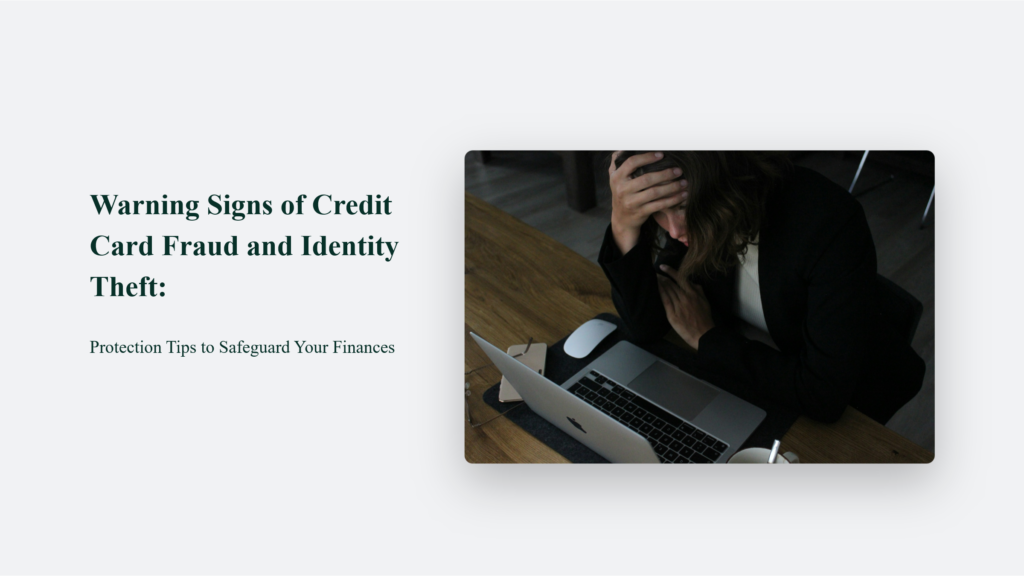

Warning Signs of Credit Card Fraud and Identity Theft: Protection Tips to Safeguard Your Finances

As Seen On
In today’s digital age, where our personal and financial information is constantly at risk, it’s crucial to stay vigilant against the ever-evolving threats of credit card fraud and identity theft. These insidious crimes can wreak havoc on your financial well-being, leaving you with a shattered sense of security and a long road to recovery.
Imagine the sinking feeling of discovering unauthorized charges on your credit card statement or receiving calls from debt collectors for accounts you never opened – it’s a nightmare scenario that no one should endure.

A Personal Anecdote: The Chilling Reality of Identity Theft
Credit card fraud can be an equally chilling experience. I recall my friend Alex’s ordeal when he discovered unauthorized charges on his credit card statement. It started with a few small changes that he initially brushed off but soon escalated to larger purchases totalling thousands of dollars. Alex immediately contacted his credit card issuer, but disputing the fraudulent charges was a bureaucratic nightmare. He spent countless hours on the phone, providing documentation and filing police reports.
Despite his efforts, the credit card company was slow to resolve the issue, leaving him liable for the fraudulent charges in the interim. The emotional toll was immense. Alex lived in constant fear, wondering if his card information had been compromised again. He meticulously scrutinized every statement, losing sleep over the possibility of new unauthorized charges appearing. The experience left him feeling violated and vulnerable, questioning the security measures to protect consumers.
Ultimately, the credit card company resolved the issue in Alex’s favour, but the ordeal lasted for months, causing significant stress and anxiety. It served as a harsh reminder that credit card fraud can strike anyone, and the consequences can be far-reaching, impacting not only one’s finances but also their mental well-being.
While credit card issuers have implemented various security measures, individuals must remain vigilant and proactively safeguard their financial information. Recognizing the warning signs and taking immediate action can minimize the potential damage and protect yourself from the emotional turmoil accompanying credit card fraud.
Statistics and Data:
- Identity theft was the top consumer complaint category in 2021, with over 1.4 million reports filed to the Federal Trade Commission (FTC). Credit card fraud was the most common form, accounting for 34% of all identity theft reports that year.
- According to Javelin Strategy & Research, the average cost per victim of identity theft in 2021 was $1,551, with total losses amounting to a staggering $28 billion.
- Furthermore, 42% of victims experienced misuse of an existing account, while 28% had new accounts opened in their name without authorization.
- Resolving a case of identity theft is a lengthy and costly process. A study by Experian found that it takes an average of 16 months and $1,343 to resolve such cases.
These statistics underscore the importance of remaining vigilant and proactively protecting one’s personal and financial information from identity thieves and fraudsters.
Warning Signs of Credit Card Fraud
Credit card fraud and identity theft are insidious crimes that can wreak havoc on your financial well-being. Imagine the sinking feeling of discovering unauthorized charges or receiving calls about accounts you never opened – a nightmare scenario that no one should endure. However, recognizing the warning signs and taking proactive measures can significantly reduce your risk.
- Unauthorized Charges: Carefully review statements for unfamiliar charges, even small amounts that could indicate larger fraud.3
- Missing Statements: Not receiving your monthly statements could mean someone changed your billing address to conceal fraudulent activity.
- Unexpected Account Inquiries: Calls or letters about accounts you didn’t open are clear signs your personal information has been compromised.
- Unexplained Credit Score Changes: New accounts opened in your name can cause significant, unexplained drops in your credit score.
Warning Signs of Identity Theft
- Unfamiliar Accounts or Charges: Notices of accounts or charges you need to recognize on your credit report or bank statements could indicate identity theft.
- Denied Credit Applications: Being denied credit or employment due to negative items on your report that you don’t recognize may signal identity theft.
- Suspicious Mail or Calls: Be wary of unsolicited communications about loans, credit cards, or financial products you didn’t apply for.
- Tax-Related Issues: Receiving notices about unreported income or taxes owed on wages you didn’t earn could mean someone is using your Social Security number for employment.
Protection Tips: Safeguarding Your Identity and Finances

Protecting yourself from credit card fraud and identity theft requires a proactive approach and a commitment to vigilance. Here are some powerful strategies to help you stay one step ahead of these insidious crimes:
Monitor Your Credit Reports and Accounts
Regularly checking your credit reports and financial accounts is one of the most effective ways to detect suspicious activity early on. By law, you’re entitled to a free annual credit report from the three major credit bureaus (Experian, Equifax, and TransUnion). To monitor your credit more frequently, stagger your requests throughout the year.
Set up account alerts and notifications with your credit card companies and banks. Many institutions offer services that notify you of significant account activity, such as large purchases or changes to your personal information.
Implement Strong Password Practices
Weak or reused passwords are a common entry point for cybercriminals. Implement robust, unique passwords for all your online accounts, and consider using a password manager to store and generate complex passwords securely. Additionally, two-factor authentication can be enabled whenever possible to provide an extra layer of security.
Be Cautious with Personal Information
Exercise caution when sharing personal information, especially over the phone, via email, or on unsecured websites. Legitimate organizations will never ask for sensitive information like your Social Security number or credit card details through unsolicited communications.
Shred Sensitive Documents
Identity thieves often resort to dumpster diving to obtain personal information from discarded documents. Invest in a quality shredder and shred any documents containing sensitive information before disposing of them.
Use Credit Monitoring Services
Consider subscribing to a reputable credit monitoring service. These services can alert you to suspicious activity on your credit report, such as opening new accounts or inquiries from unfamiliar lenders.
Be Cautious with Public Wi-Fi
Public Wi-Fi networks are convenient but can also be a playground for cybercriminals. Avoid accessing sensitive information or conducting financial transactions on public networks, as they are often unsecured and vulnerable to eavesdropping.
Keep Your Software and Devices Updated
Outdated software and operating systems can leave your devices vulnerable to cyber threats. Regularly update your software, apps, and devices to ensure you have the latest security patches and features.
The Bottom Line:
By staying informed, vigilant, and proactive, you can significantly reduce your risk of falling victim to credit card fraud and identity theft. Remember, protecting your personal and financial information is an ongoing process, but the peace of mind it provides is invaluable.
Frequently Asked Questions:
What is a credit freeze, and should I consider it?
A credit freeze restricts access to your credit report, making it more difficult for someone to open new accounts in your name. It’s a powerful tool to prevent identity theft, but it may also prevent you from opening new accounts or applying for credit.
How often should I check my credit reports?
It’s recommended to check your credit reports from all three major credit bureaus at least once a year. You can request a free annual credit report from each bureau.
What should I do if I suspect credit card fraud or identity theft?
– Contact your credit card company or bank immediately to report the suspicious activity and request a new card or account number.
– Place a fraud alert on your credit reports with the three major credit bureaus (Experian, Equifax, and TransUnion).
– File a report with the Federal Trade Commission (FTC) and local law enforcement agencies.
Konger
Up until working with Casey, we had only had poor to mediocre experiences outsourcing work to agencies. Casey & the team at CJ&CO are the exception to the rule.
Communication was beyond great, his understanding of our vision was phenomenal, and instead of needing babysitting like the other agencies we worked with, he was not only completely dependable but also gave us sound suggestions on how to get better results, at the risk of us not needing him for the initial job we requested (absolute gem).
This has truly been the first time we worked with someone outside of our business that quickly grasped our vision, and that I could completely forget about and would still deliver above expectations.
I honestly can't wait to work in many more projects together!
Disclaimer
*The information this blog provides is for general informational purposes only and is not intended as financial or professional advice. The information may not reflect current developments and may be changed or updated without notice. Any opinions expressed on this blog are the author’s own and do not necessarily reflect the views of the author’s employer or any other organization. You should not act or rely on any information contained in this blog without first seeking the advice of a professional. No representation or warranty, express or implied, is made as to the accuracy or completeness of the information contained in this blog. The author and affiliated parties assume no liability for any errors or omissions.

